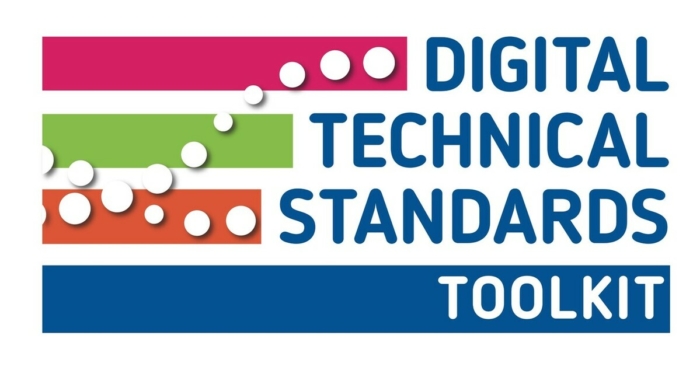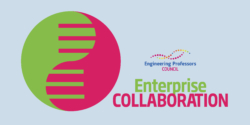
Theme: Research, Collaborating with industry for teaching and learning, Graduate employability and recruitment
Authors: Associate Prof Graeme Knowles (Director of Education Innovation, WMG), Dr Jane Andrews (Reader in STEM Education Research) and Professor Robin Clark (Dean WMG)
Keywords: Transformational Change, Industry-Education Partnerships, Educational Research, Scholarship
Abstract: The ‘Transforming Tomorrow’ Project is an example of how educational research may be used to inform and underpin change in engineering education. Building on previous research, the project provides an example of how research and scholarship may be used to effect transformational change by linking industrial requirements with educational strategy and practice. Bringing together theoretically grounded curriculum design with two years of educational research, mainly conducted during the pandemic, the primary output thus far is the development of a series of professional development workshops. Such workshops are aimed at preparing engineering educators to make sure that as WMG emerges out of the pandemic and into a time of unprecedented uncertainty and change, we continue to produce high quality graduates able to ‘hit the ground running’ upon entering employment. This short paper summarises the background to the project, discussing the methodology and providing exemplar data whilst also outlining the content of the workshops.
Introduction
WMG has a strong history of providing both practically relevant education and producing graduates who are able to impact the companies they work for from the earliest point of employment. The Department’s experience, built up over many years, has come about through the development of strong relationships between WMG colleagues and industry, through mutual understanding and the co-creation of relevant courses. However, as with the whole of the Higher Education Sector, WMG cannot afford to stand still. With the ever-increasing and dynamic demands of the Engineering Sector there is a constant need to reflect and consider whether impactful outcomes are still being realised.
The ‘Transforming Tomorrow’ Project is about taking a holistic view of the Department’s educational provision in order to understand the effectiveness of the provision from students’ perspective, whilst also taking account of the views and experiences of staff and industry employers. With the research underway, a number of datasets collected and emergent findings analysed, WMG has the basis with which to begin to affect transformational change both in our educational offerings and also in how we better meet the needs of industry. This paper reports the first part of the Project.
Context
For many, the pace of change since the onset of Covid19 has been challenging. In WMG, having to completely reconfigure what is an exceptionally industrially focused curriculum and teach online took many by surprise. At the beginning of the Pandemic a critical literature review was undertaken looking at blended and online learning; five key themes were identified:
- The need to adopt a design approach to curriculum development
- The quality of the student experience
- Student engagement
- The challenges and benefits of blended learning
- Student and academic perceptions of online learning
Each of these themes have in common the fact that the virtual learning approaches analysed and discussed were developed over a significant period of time.
Method and Findings
A mixed methodological approach was utilised starting with a quantitative survey of first year students and staff. This first survey, which took place in October 2021, focused on students’ perceptions of what types of learning approaches and techniques they expected to encounter whilst at university. Comprising a mixture of Degree Apprentices and Traditional Engineering undergraduates, the cohort were unique in that they had spent a significant part of their pre-university education learning from home during the lockdown.
The results of the survey are given below in Figure 1 and reveal that, during the Pandemic at least, engineering undergraduate students start university with the perception that they will be spending much of their time working independently and learning online.
Figure 1: First Year Engineering Students’ Expectations of Learning and Teaching at University: Mid-Pandemic (October 2021)
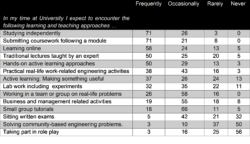
In looking at the above table one thing that immediately drew colleagues’ attention was that only half of the students expected to frequently encounter active learning approaches, and just under two-fifths anticipated frequently engaging in real-life work-related activities. Having given considerable thought as to how to assure that learning through the Pandemic maintained high levels of both these activities, this took colleagues by surprise. It also suggested a lack of preparedness, on behalf of the students, to proactively engage in practical engineering focused education.
For the academic staff, a survey conducted at the same time sought to determine colleagues’ preferences in terms of teaching approaches. Figures 2 and 3 below provide an overview of the answers to two key questions…
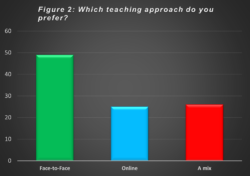
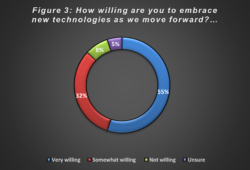
This paper necessarily provides only a small insight into the research findings, in total over 1,300 undergraduate and postgraduate students and over 200 colleagues have participated in the research thus far. Analysing the findings and feeding-forward into the Education and Departmental Executive structures, the findings are being used to shape how education has continued under the lockdown (and will continue into the future). With a firm-eye for the ever-changing requirements and expectations of industry, a series of pedagogical workshops grounded in the Project research findings have been developed. The aim of such workshops is to upskill academic colleagues in such a way so as to be able to guarantee that WMG continues to offer industrially relevant education as society moves out of the Pandemic and into an unknown future.
Moving Forward: Scholarship, Synergy & Transformational Change: Meeting the learning and teaching challenges of 21st Century Industry
Planning, the second stage of the Project has meant synthesizing the research findings with organisational strategy and industrial indicators to put in place a series of professional-development workshops for teaching colleagues. Each workshop focuses on a different area of educational practice and considers the needs of industry from a particular standpoint. Plans are underway to use the workshops themselves as opportunities to gather data using an Action Research Methodology and a Grounded Theory Philosophy. The Project is at best estimate, midway through its lifecycle, but may continue for a further two years depending on the Covid situation.
The planned workshops, which will be offered to colleagues throughout the Spring and Summer, 2022, will focus around six distinctive but interlinked topics:
1. Teaching to Meet the Challenges of Industry
- Contextualising learning in society
- Looking back to move forward
- Transforming teaching
- Producing work-ready graduates when ‘work’ is constantly changing.
2. Student-Centred Active Learning
- Deep or surface learning?
- Engendering independent learning in the millennial student
- Co-creation in learning
- Encouraging a learning culture
3. Growing independent learners
- Developing self-authorship in students (and staff)
- Disruptive pedagogies = flexible graduates
- Authenticity in assessment
- Re-imagining assessment for employability
4. Levelling the Playing Field
- Supporting students to succeed
- Post-colonial industry-focused learning
- Inclusivity in learning and teaching
- Student-led, research-based, real-life teaching
5. Re-Designing what we do
- Design thinking for the future
- Linking work and education for the millennium generation
- Knowledge exchange and co-creation
- Embedding sustainability principles across the curriculum
6. Engineering an environment for learning
- Scaffolding active learning across
- Finding space for study
- Bringing engineering challenges into learning
- Off-On-Hybrid: Moving forward from Covid
Conclusion
In conclusion, society is entering what has been termed ‘the new normal’; for WMG, there is nothing ‘normal’ about what we do. We are entering a ‘Transformational Time’; a period when by completely changing and challenging our educational offerings and culture we will work with our industrial partners to purposefully disrupt the ‘new normal’. In doing so we will continue to produce forward-thinking, flexible and synergetic learning experiences from which highly qualified graduates able to succinctly blend into the workplace will emerge.
Any views, thoughts, and opinions expressed herein are solely that of the author(s) and do not necessarily reflect the views, opinions, policies, or position of the Engineering Professors’ Council or the Toolkit sponsors and supporters.

